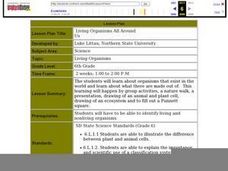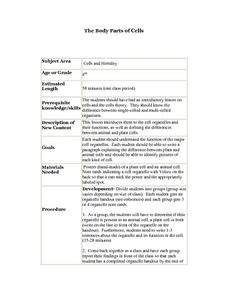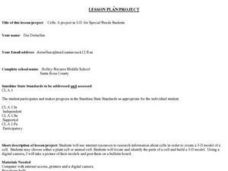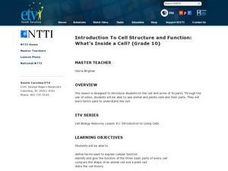Scholastic
Study Jams! Animal Cells
Using stunning computer imagery, this resource introduces life science learners to cells. It zeros in on the animal cell and the function of its more prominent organelles. Additional support is offered in the form of a self-assessment...
Baylor College
Magnifying and Observing Cells
Though it isn't a novel activity to prepare onion cell and Elodea plant cell slides as examples of cells in a microbiology unit, this resource will leave you thoroughly prepared. As pupils examine the slides that they prepare, they draw...
Curated OER
Regents High School Examination: Living Environment 2003
The living environment, from the interior of a cell to the complex relationships among populations, are queried in this final examination. Learners look at air pollution maps, diagrams of cells, population graphs, and drawing of cells....
Curated OER
Regents High School Examination: Living Environment 2005
The 2005 version of the Regents High School Examination in the area of ecology is as comprehensive as previous years' exams. It consists of 40 multiple choice questions on everything from the structure of DNA to the interactions within...
Curated OER
Regents High School Exam: Living Environment 2008
Tne New York Regents High School Examinations are comprehensive and include various styles of questions, includingmultiple choice and the analysis of graphs. This particular version, the 2008 Living Environment exam surveys a variety of...
Curated OER
Regents High School Examination: Biology 2006
Twenty-six pages of biology questions, mostly in multiple-choice form, are included in the all-encompassing New York State Regents exam. It assesses every topic typically covered in a high-school biology course. Create your own answer...
Biology Junction
Cells and Their Organelles
This series of handouts and images asks young scientists to read short informational paragraphs, answer identification questions, and color and label diagrams of animal and plant cells. This is a complete resource that could be given as...
Curated OER
The Good and Bad Bacteria
Students are able to name one kind of harmful bacteria and why it hurts us and also name one kind of helpful bacteria and how we use it. They describe the process of growing bacterial cultures in a lab. Students create a reasonable...
Curated OER
Cells: A First-Hand View
In the first of two activities, your charges prepare wet mount slides of cork and bean sprout cells in imitation of Robert Hooke's historical investigation. An excerpt from his notes is included. Then, investigators compare animal cells...
Curated OER
Living Organisms All Around Us
Sixth graders study organisms that exist in the world and what they are made up of. They participate in a nature walk, a presentation, a drawing of an animal and plant cell, draw a ecosystem, and fill out a Punnett square.
Curated OER
3-D Cell Model
Life science laureates choose a plant or animal cell to construct a model of as an at-home project. This handout provides guidelines, suggested materials, and a grading rubric for their reference. A full-page letter to parents is also...
Curated OER
Plant and Animal Cells: Alike and Different?
Seventh graders create a mneumonic device and a graphic organizer about the parts of plant and animal cells. In this biology lesson students are introduced to the parts of the cells and then work in groups to create projects that teach...
Curated OER
The Body Part of Cells
Eighth graders are introduced to cell organelles and their functions and the they define the differences between animal and plant cells. They write a paragraph explaining the difference between plant and animal cells and students...
Curated OER
The Cell as a System
Students review cell structures and investigate how the components of a cell operate as a system. They compare a plant and animal cell and then make a model of a cell. Students begin to understand the cell as a system by exploring a...
Curated OER
Cell-O
Students create model cells using gelatin, toothpicks, and various fruits to represent organelles. Then, students observe their models and complete a Venn Diagram comparing and contrasting plant and animal cells.
Curated OER
Cross-Section of an Animal Cell
A scanned copy of a diagram of the animal cell is what you will find on this worksheet. Learners label organelles on the lines provided. Unfortunately, the figure and font are somewhat fuzzy.
Curated OER
A Cell-a-bration
Students identify the different types of animal and plant cells. In this cell lesson students label the different cells and their functions.
Curated OER
Cell Structure and Function
For this cells worksheet, students review the different types of cells. Students identify the organelles found in an animal cell and determine the function of these organelles. This worksheet has 14 matching, 6 fill in the blank, and 5...
Curated OER
Eukaryotic Cell Structure
In this cell structure learning exercise, learners review the structure and function of eukaryotic cells. Students also compare and contrast an animal cell with a plant cell. This learning exercise has 15 fill in the blank, 8 true or...
Curated OER
Basic Units of Life
In this cells worksheet, students will review vocabulary words and information relating to the structure and function of plant and animal cells. This worksheet has 10 crossword puzzle questions, 6 multiple choice, 4 short answer...
Curated OER
Cells: A project in 3-D for Special Needs Students
Students use the internet to research information about cells in order to create a 3-D model of a cell. They may choose either to research a plant or animal cell. Students locate and identify the parts of a cell and build a 3-D mode.
Curated OER
Parts Wanted: Advertising for Cell's Organelles
Seventh graders name the parts of the cell. Students demonstrate knowledge of the parts of a cell in reference to cell functions. They apply their knowledge of the cell and the cell parts to a real world situation.
Curated OER
Introduction To Cell Structure and Function: What's Inside a Cell?
Tenth graders are introduced to the cell and some of its parts. Through the use of video, 10th graders see animal and plants cells and their parts. They learn terms used to explain the cell.
Curated OER
Cells
Young scholars research both plant and animal cell characteristics. They draw the parts of each cell and as groups present their research.

























